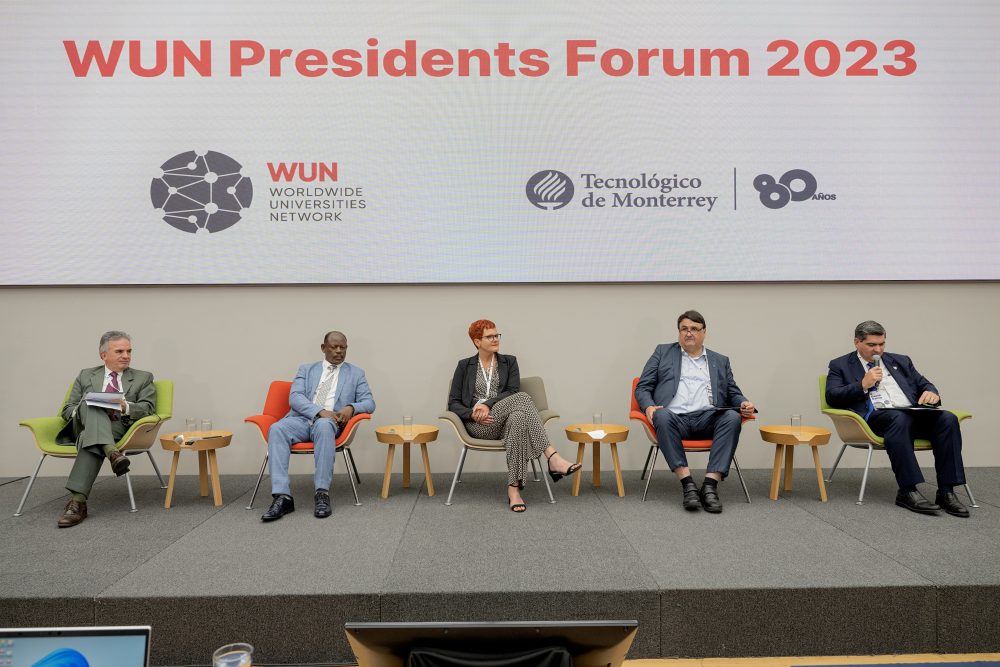
Leaders from institutions in the Worldwide Universities Network gathered in Mexico to discuss higher education’s role in combating the climate crisis. Their conversations during the Presidents Forum highlighted the ways in which university research and operations can advance sustainability.
Addressing the complex and multifaceted climate crisis requires the collaboration of experts from an array of fields. Universities are well positioned to foster that kind of work toward sustainability, say campus leaders.
The Worldwide Universities Network (WUN) convened for its Annual General Meeting, including a Presidents Forum on the theme of universities’ contributions to environmental sustainability. The event took place on 24 May 2023 at WUN member Tecnológico de Monterrey, in Mexico.
At the start of the event, WUN executive director Peter Lennie described the theme as “how universities can and should be exemplars for environmental sustainability,” before introducing keynote speaker Rudolfo Lacy Tamayo, director for climate action and environment for Latin America with the Organisation for Economic Co-operation and Development (OECD) and special envoy on climate matters to the United Nations.
Lacy shared an array of alarming statistics to emphasise the breadth and urgency of the climate crisis, as well as the need to take concerted action. “You have the knowledge, the skills, and the moral reputations to do so,” he told representatives from universities around the globe.
The conversation about research and sustainability centred on the merits of transdisciplinarity. Dawn Freshwater, Vice-Chancellor of the University of Auckland, formulated a distinction between “communities of purpose” and “communities of practice” in her remarks and argued that scholars should come together around meaningful challenges is preferable to adhering to disciplinary boundaries. Andrew Parfitt, Vice-Chancellor of the University of Technology Sydney, concurred, calling attention to the academy’s ironic adherence to Middle Age structures while attempting to tackle 21st century issues.
Both Freshwater and Parfitt emphasised the need for universities to invest resources in the transdisciplinary research that the institutions value–and that the world needs so urgently. “It’s beholden upon us to drive transdisciplinary research in response to the world’s environmental crises,” said Freshwater, while noting that boundary-crossing work requires funding to succeed. Rather than those projects serving as an alternative to researchers’ careers, they need to result in promotion and funding.
Freshwater and Sue Harrison, Deputy Vice-Chancellor for Research and Internationalisation at the University of Cape Town, both echoed the importance of an approach informed by local context and Indigenous knowledge. Harrison mentioned UCT’s sustainability plan, called Khusela Ikamva – “secure the future” in Xhosa – that pulls in research expertise from a range of disciplines, and Freshwater described the influence of mātauranga, Māori knowledge, on her university’s approach to sustainability work.
In a panel on leadership and sustainability, the panellists were candid about the inevitability of making mistakes in the process of improving sustainable practices on campus. Martin Paul, president of Ruhr University Bochum, spoke about the importance of getting student and faculty buy-in. Student groups are particularly keen to criticise “green-washing,” said Paul, referring to a surface-level appearance of sustainability that lacks real impact. Agnes Nairn, Pro Vice-Chancellor for Global Engagement at the University of Bristol, advocated for designating certain students as “sustainability champions,” who work to keep the university on track.
In a discussion on sustainability in education, participants described strategies to make the climate crisis feel more relevant and immediate to students. Rocky Tuan, vice-chancellor of The Chinese University of Hong Kong, advocated for local case studies, such as his students’ attention to the challenges of intense population density. Sandra Almeida, president of Universidade Federal de Minas Gerais and chair of WUN’s governing board, discussed the value of course offerings in the social sciences and humanities for students in the sciences. Her comments tied into a theme that persisted across the panels: the moral dimension of the climate crisis. As Tuan put it, universities need to teach students to “not just do things, but the right things.”
To further pursue sustainability goals across research, leadership, and education, the group agreed on a need for accountability. They also expressed the weighty obligations of educating young people, transforming their communities, and developing new solutions to the climate crisis. As Almeida summed it up, “Universities cannot solve all social problems, but problems cannot be solved without universities.”
View the full discussion on YouTube.